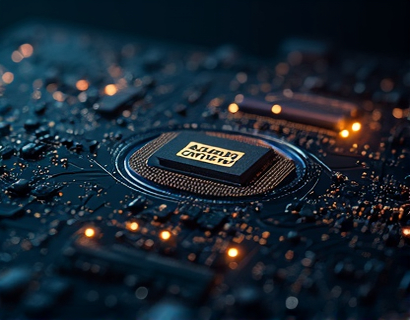Smart Contract Solutions for Pegged Token Creation and Seamless UCASH Exchange in Decentralized Finance
In the rapidly evolving landscape of digital currencies and decentralized finance, smart contracts have emerged as a pivotal technology, offering innovative solutions for creating stable tokens pegged to UCASH and enabling seamless bidirectional trading. This article delves into the intricacies of how smart contracts are transforming the digital currency space, providing a secure, efficient, and user-friendly approach to financial management. By focusing on the technical and practical aspects, this piece aims to educate cryptocurrency enthusiasts and DeFi innovators on the potential of smart contract solutions in enhancing the stability and flexibility of decentralized finance.
Understanding Smart Contracts in Decentralized Finance
Smart contracts are self-executing contracts with the terms of the agreement directly written into code. They run on blockchain technology, ensuring transparency, immutability, and security. In the context of decentralized finance, smart contracts play a crucial role in automating and facilitating various financial operations without the need for intermediaries. One of the most significant applications of smart contracts is in the creation of stable tokens pegged to UCASH, a digital asset designed to maintain a stable value relative to the UCASH cryptocurrency.
Creating Stable Tokens Pegged to UCASH
The process of creating stable tokens pegged to UCASH involves several key steps, all of which are facilitated by smart contracts. First, a reserve of UCASH is established to back the stable tokens. This reserve ensures that each token has a corresponding amount of UCASH, maintaining the peg. The smart contract manages the issuance and redemption of tokens, ensuring that the number of tokens in circulation is always proportional to the reserve of UCASH.
Here’s a high-level overview of the smart contract mechanism:
- Reserve Creation: A initial reserve of UCASH is locked in the smart contract. This reserve serves as the backing for the stable tokens.
- Token Issuance: When a user initiates a request to create tokens, the smart contract checks if there is sufficient UCASH in the reserve. If the condition is met, the contract issues a predetermined amount of stable tokens and deducts the corresponding amount of UCASH from the reserve.
- Redemption: For token redemption, a user sends the stable tokens back to the smart contract. The contract verifies the tokens and, if valid, transfers the corresponding amount of UCASH from the user's wallet to the reserve, effectively destroying the tokens.
- Automated Adjustments: To maintain the peg during market fluctuations, the smart contract can include mechanisms for automatic adjustments, such as burning or minting tokens based on predefined algorithms.
These smart contract functions ensure that the stable tokens remain closely tied to the value of UCASH, providing users with a reliable and stable digital asset. The automation and transparency of these processes reduce the risk of human error and fraud, enhancing trust in the system.
Seamless Bidirectional Trading
One of the most compelling features of smart contract-based stable tokens is the ability to engage in seamless bidirectional trading. This means users can convert stable tokens to UCASH and vice versa with minimal friction and maximum efficiency. The smart contract facilitates this process by providing clear and transparent rules for conversion, ensuring that transactions are executed instantly and securely.
The bidirectional trading mechanism works as follows:
- Conversion to UCASH: Users can initiate a conversion request to exchange their stable tokens for UCASH. The smart contract verifies the tokens and, if approved, transfers the UCASH to the user's wallet while reducing the token balance.
- Conversion to Tokens: Conversely, users can send UCASH to the smart contract to receive stable tokens. The contract checks the UCASH balance, issues the corresponding tokens, and updates the UCASH reserve.
- Transaction Fees: To cover operational costs and incentivize liquidity providers, the smart contract can incorporate transaction fees. These fees are automatically deducted during each conversion, ensuring the sustainability of the system.
By eliminating the need for intermediaries and reducing transaction times, smart contract-based trading provides a more efficient and user-friendly experience. Users can manage their assets with greater ease and confidence, knowing that the process is secure and transparent.
Enhancing Decentralized Finance with Smart Contracts
The integration of smart contracts in the creation of stable tokens and bidirectional trading significantly enhances the capabilities of decentralized finance. Here are some key benefits:
1. Security and Trust
Smart contracts operate on blockchain, which is inherently secure and tamper-proof. This ensures that all transactions and contract executions are immutable and verifiable, reducing the risk of fraud and increasing trust among users.
2. Efficiency and Speed
Automated smart contracts execute transactions instantly, without the need for manual intervention or third-party approval. This not only speeds up the process but also reduces costs associated with intermediaries.
3. Transparency and Accessibility
All smart contract operations are recorded on the blockchain, providing full transparency. Users can monitor the reserve levels, token issuance, and trading activities in real-time, enhancing accountability and accessibility.
4. Flexibility and Customization
Smart contracts can be programmed with various rules and conditions, allowing for customization to suit different use cases. This flexibility enables developers to create tailored solutions for specific financial needs, fostering innovation in the DeFi space.
5. Reduced Counterparty Risk
Since smart contracts operate without intermediaries, the risk associated with counterparty default is minimized. The contract ensures that obligations are met automatically, providing a higher level of security for all parties involved.
Challenges and Considerations
While smart contract solutions offer numerous advantages, there are also challenges and considerations to keep in mind:
1. Smart Contract Vulnerabilities
Smart contracts are only as secure as their code. Bugs or vulnerabilities in the code can lead to significant losses. Rigorous testing and auditing are essential to mitigate these risks.
2. Regulatory Uncertainty
The regulatory landscape for decentralized finance and stablecoins is still evolving. Compliance with regulations is crucial to ensure the sustainability and legality of smart contract-based solutions.
3. User Education
Users need to understand the mechanics of smart contracts and the risks involved. Educating the community is vital for widespread adoption and effective usage of these technologies.
Future Prospects
The potential for smart contract solutions in creating pegged tokens and facilitating seamless trading in decentralized finance is vast. As the technology matures and more developers adopt these practices, we can expect to see:
- Increased adoption of stablecoins and pegged tokens in everyday transactions
- Development of more sophisticated DeFi protocols leveraging smart contracts
- Enhanced interoperability between different blockchain platforms
- Greater integration of DeFi solutions into traditional financial systems
These advancements will further solidify the role of smart contracts in shaping the future of digital finance, making it more accessible, secure, and efficient for users worldwide.










































